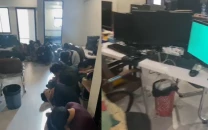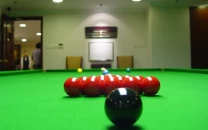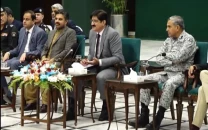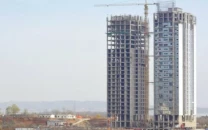Board examinations: Axis of depravity
It was most disappointing to note that in several areas in interior Sindh, pupils could be seen using unfair means.

Board examinations: Axis of depravity
The advent of summers marks the end of school and college years. However, the assessment of pupils remains stilted with scams of sorts. As the examinations of Secondary School Certificate (SSC) began in different parts of Sindh, media reports and complaints about widespread incidences of cheating began pouring in.
It was most disappointing to note that in several areas in interior Sindh, pupils could be seen using unfair means in the Sindhi language paper. Whereas, in other areas of Karachi, routine complaints of late supply of examination material and the shady performance of invigilation staff had cast shadows on the transparency and conduct of the examinations. The gravity of the situation is obvious from the fact that the President had to discuss the matter with the Governor — the controlling authority of examination boards in the province. Even the examinations of Higher Secondary School Certificate (HSSC) were also affected, albeit with a lesser intensity.
Turning a blind eye towards the shoddy conduct of examinations may not be a wise approach. The reasons behind this grave menace have to be found and objectively analysed.
Who is responsible?
The prevalence of cheating is not the failure of educational institutions or examination boards alone. It clearly shows the breakdown of social and moral values in society. Many incidents have shown parents and siblings facilitating the supply of cheating material to concerned pupils and they weren’t guilty about it. This entails that these people believe that obtaining a marks certificate with high scores is what matters and not the aptitude. In other words, it is tantamount to sowing the seeds of corruption in the tender fields of young minds from the very beginning. Therefore, it is no surprise that when such folks grow up and enter into various cadres of professional life, they promote the same type of malpractices unrepentantly.
Where does it begin?
Examinations are the final stage of an integrated system of education. If the curriculum is not properly delivered to students and regular assessments are not carried out, there is a very limited possibility that students would be able to take examinations with confidence. As stakeholders connected to education are marred by scandals and malfunctioning on a usual basis, overall routines are seldom followed. From hiring of teachers to timely printing of textbooks, ghost schools to absconding teachers, the list of aberrations is very long.
Moreover, despite countless projects, donor funded programmes and much trumpeted corrective actions, the edifice of education rests on very weak foundations. Thus conducting examinations in a dubious manner has repercussions on many levels. It is because of the poor performance of all stake holders that pupils do not gain enough knowledge and confidence to qualify for a higher level of education. The proverbial collusion of the educational establishment, teachers, political and local activists joins hands to defeat merit and fair play.
Its consequences
Eventually the unreliable performance of examination boards and their affiliates result in poor quality of human resource development. One finds that those mindful and socially capable of subscribing to parallel education systems and examinations finally dominate all walks of practical life. Reputed universities and institutions devise stringent measures to double check and reexamine the applicants through admission tests and interviews. It is not uncommon to find that students possessing 80 per cent marks or more through a slack system are not even able to obtain passing marks in university entrance examinations.
As a result, these students have to suffer for life as no opportunity can be acquired by them through simple means of merit. On the other hand, wealthy and influential children are able to survive for obvious reasons. Thus, a cycle of corruption is propelled which sometimes results in scams such as the fake degree fiasco and similar syndromes.
The solution
One way of instituting corrective measures in this state of affairs is to develop an independent body of academics and education managers to conduct examinations under strict vigilance and monitoring. Support of law enforcing agencies, including civil armed forces, may be sought to prevent any eventuality of cheating. As for the assessment of answers sheets, at least two examiners be assigned for each answer copy. Starting a pilot project in any chosen location of the province would be helpful in this regard.
Implementation of some of these corrective measures will have far reaching results. Pressure will be built on teachers and school managements to properly perform their allied duties, rise in competence and attainment levels will boost human resource development, the level of corruption will start reducing, progress in various social and economic sectors and a real trickledown effect of public investment in the society will also be noticed.
The writer is Professor and Chairman, Department of Architecture and Planning, NED University of Engineering and Technology, Karachi
Published in The Express Tribune, June 18th, 2011.


















COMMENTS
Comments are moderated and generally will be posted if they are on-topic and not abusive.
For more information, please see our Comments FAQ